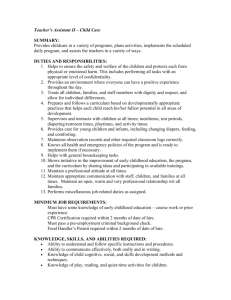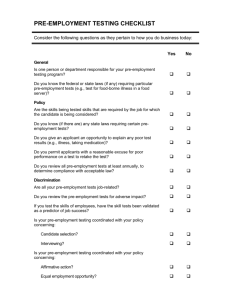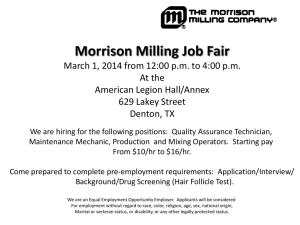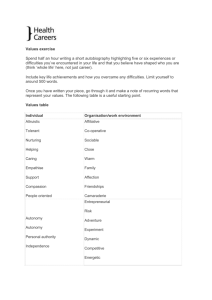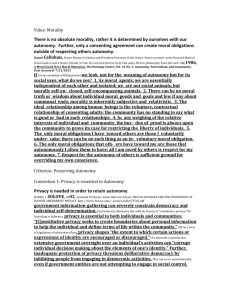File
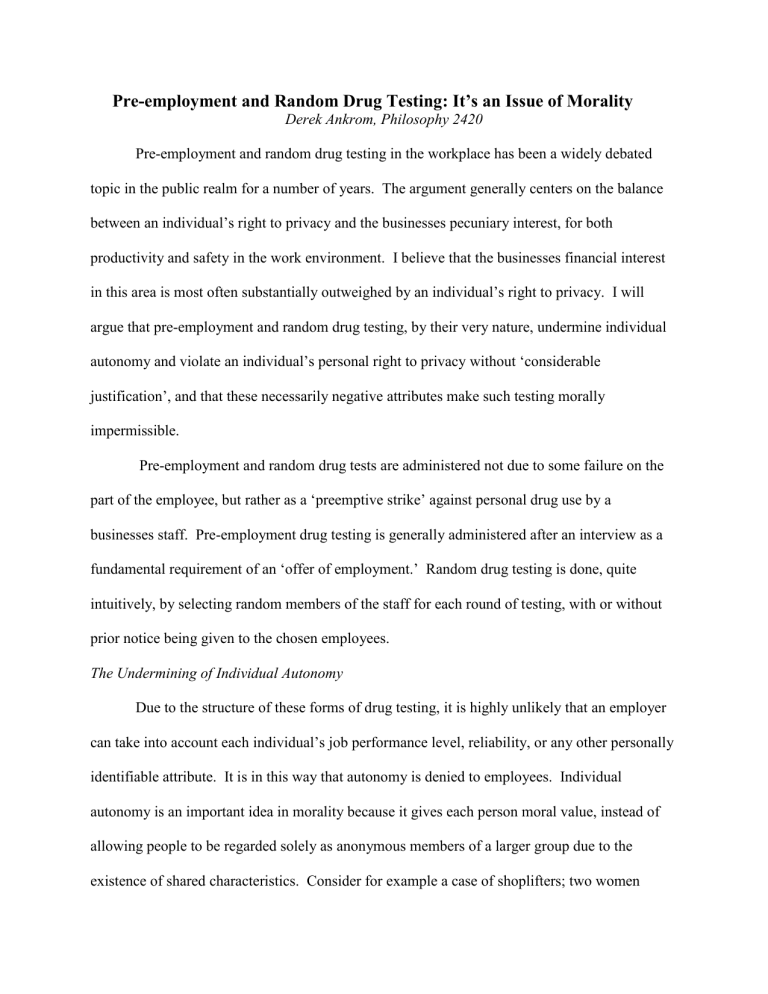
Pre-employment and Random Drug Testing: It’s an Issue of Morality
Derek Ankrom, Philosophy 2420
Pre-employment and random drug testing in the workplace has been a widely debated topic in the public realm for a number of years. The argument generally centers on the balance between an individual’s right to privacy and the businesses pecuniary interest, for both productivity and safety in the work environment. I believe that the businesses financial interest in this area is most often substantially outweighed by an individual’s right to privacy. I will argue that pre-employment and random drug testing, by their very nature, undermine individual autonomy and violate an individual’s personal right to privacy without ‘considerable justification’, and that these necessarily negative attributes make such testing morally impermissible.
Pre-employment and random drug tests are administered not due to some failure on the part of the employee, but rather as a ‘preemptive strike’ against personal drug use by a businesses staff. Pre-employment drug testing is generally administered after an interview as a fundamental requirement of an ‘offer of employment.’ Random drug testing is done, quite intuitively, by selecting random members of the staff for each round of testing, with or without prior notice being given to the chosen employees.
The Undermining of Individual Autonomy
Due to the structure of these forms of drug testing, it is highly unlikely that an employer can take into account each individual’s job performance level, reliability, or any other personally identifiable attribute. It is in this way that autonomy is denied to employees. Individual autonomy is an important idea in morality because it gives each person moral value, instead of allowing people to be regarded solely as anonymous members of a larger group due to the existence of shared characteristics. Consider for example a case of shoplifters; two women
commit the same offense (e.g. stealing a loaf of bread), at the same store, on the same day; but for very different reasons. One woman steals the loaf of bread to spite the store owner for giving her incorrect change even though she is rich and could easily purchase the bread, while the other woman steals the bread to feed her and her two children who are homeless and starving. Most would agree that the reasons for taking the bread should be taken into account when determining whether or not each committed an immoral act; and that the action of the starving mother was morally permissible, if not obligatory, while the action of the rich woman was morally wrong. It is widely accepted that they may be treated differently based upon their individual circumstances and intentions. This belief is underwritten by the concept of individual autonomy, where all people have worth and sovereignty as individuals and not just as members of a larger group. By testing all current or prospective employees, without regard to their personal history, job performance, or credentials; the employer sends a de facto message to the individual, that no matter what they have achieved or how well they have behaved, they fall more importantly into a group bound by a single common characteristic… the ability and capacity to use drugs.
If all people have independent moral value, then individual autonomy should be protected. It seems clear that all people do indeed bear at least some level of independent moral value; other wise it would be permissible to treat those people as inanimate objects or animals.
Thus, it follows that individual autonomy should be protected. The practice of required preemployment and random drug testing denies the individual of sovereignty, even over their own body. The very nature of this testing prevents the affected employees from maintaining their autonomy, and as such communicates in a prima facie way that people qua people don’t have independent moral value. I find this disturbing as it violates the concept of moral progress.
The view of a pre-employment and random drug testing advocate would implicitly deny that the abolition of slavery in the United States, apartheid in South Africa, and the caste system in India were morally necessary, because the policies of those institutions could not be unacceptable if we have no moral obligation to those negatively affected. Many would agree that the very aspect of these social systems that made them wrong was that they treated people like property or objects that could be denied autonomy simply due to their ethnicity, social status, or some other common characteristic that allowed individuals to be treated as a group, first and foremost, and thus denied of their individuality.
Some may question whether or not simply drug testing all applicants or random workers unfairly denies them their autonomy, because the business really does have an interest in assuring that applicants are professionally reliable and personally harmless. There is, however, an implicit assumption in this complaint that drug testing will be able to identify who is and who is not reliable or dangerous. While the media and many societal leaders use individual examples of radical behavior by a person under the influence of drugs to promote a ‘drug-free workplace’, it is a clear falsehood that every marijuana smoker, or cocaine user for that matter, is unreliable or poses some danger to other employees and/or the financial interests of the business. When decisions about the ability of an individual to perform a job are made not based that person’s actual ability to perform the job, but rather on some indirectly related characteristic, the implications are quite possibly endless. For example, an employer could decide that based on their personal experience employees who do not have a land-line telephone are less reliable to call in when they are sick. As a result they choose not to hire applicants who use cell phones only. Most would find this arbitrary and wholly without sound justification. It is plausible that cell phone-only users could have been less reliable in the past to call in when they’re sick or
running late, but surely it’s not fair to claim that all cell phone-only users share the same fault.
In fact, the reliability of the employee lies within that person, and many cell phone-only users are most likely very good, dedicated employees. The same holds true with drug users. It is plausible that some drug users could be dangerous or unreliable, but it seems wholly unfair and ignorant to operate on the assumption that all drug users share those characteristics. Again, the reliability and harmlessness of the employee lies within that person, not necessarily in whether or not they smoke marijuana; but this is exactly what pre-employment and random drug testing advocates would have us believe.
The Violation of an Individual’s Right to Privacy
The use of pre-employment and random drug testing is an invasive policy that violates an employee’s right to privacy. Just as an employer would almost always have no claim against an employee to know what they ate for lunch, the same holds true for other substance the employee may freely and willfully allow into their bodies, without considerable justification for requiring such information.

